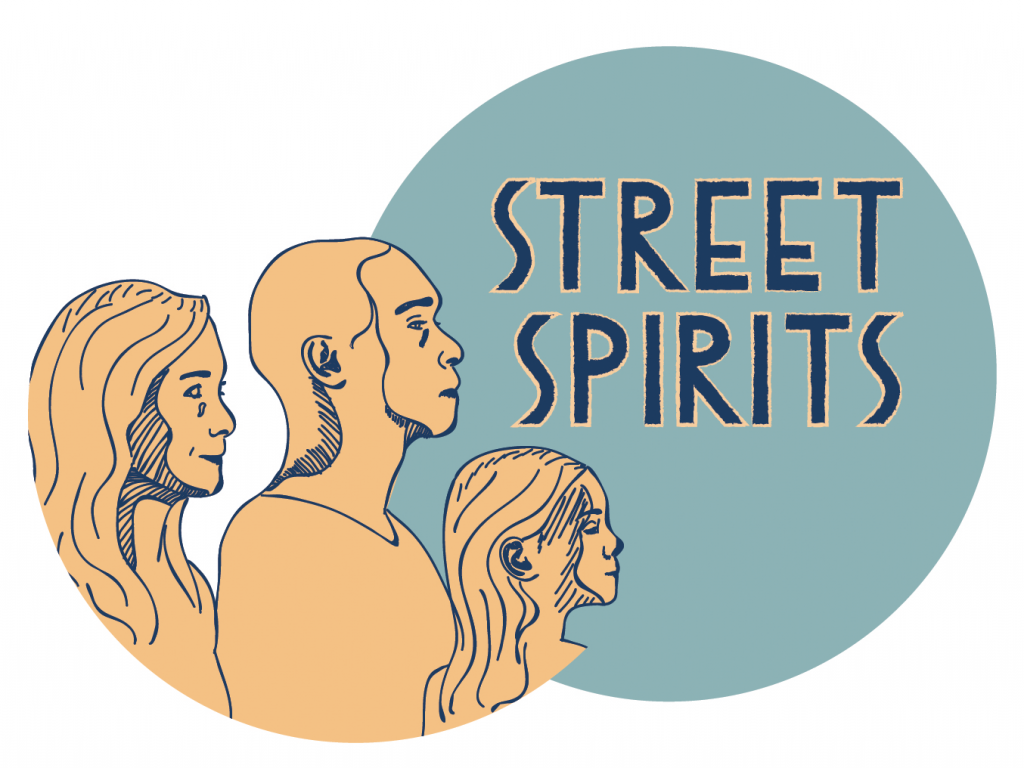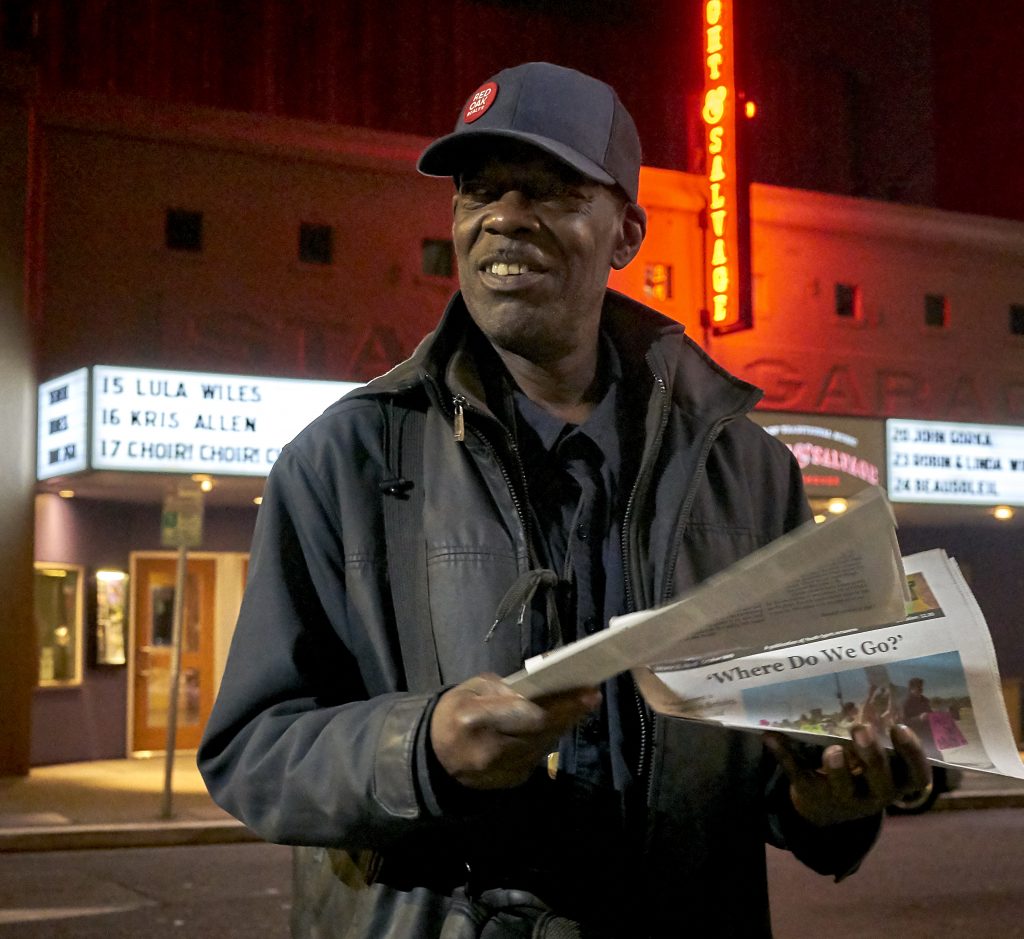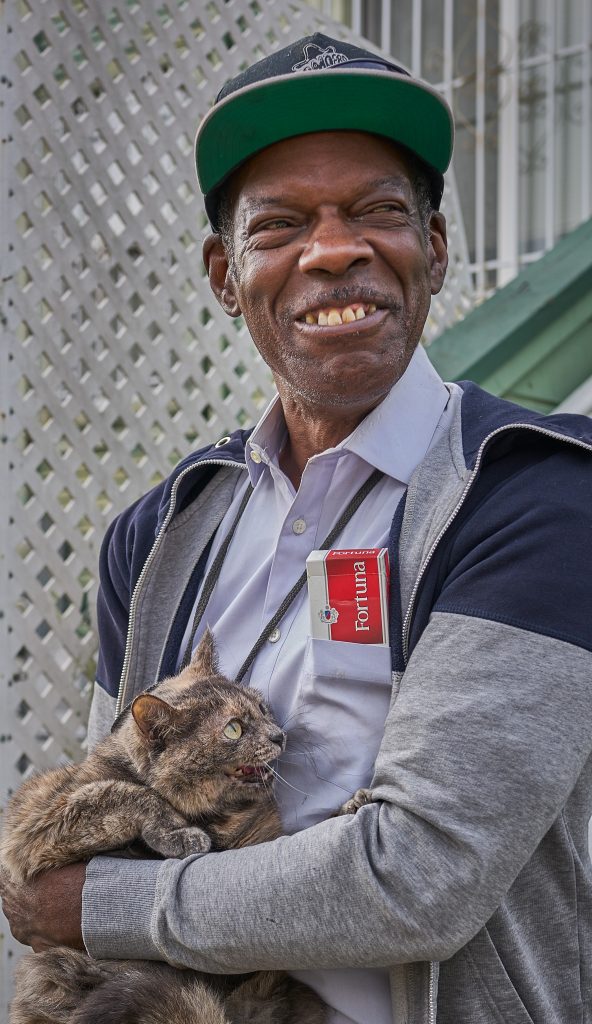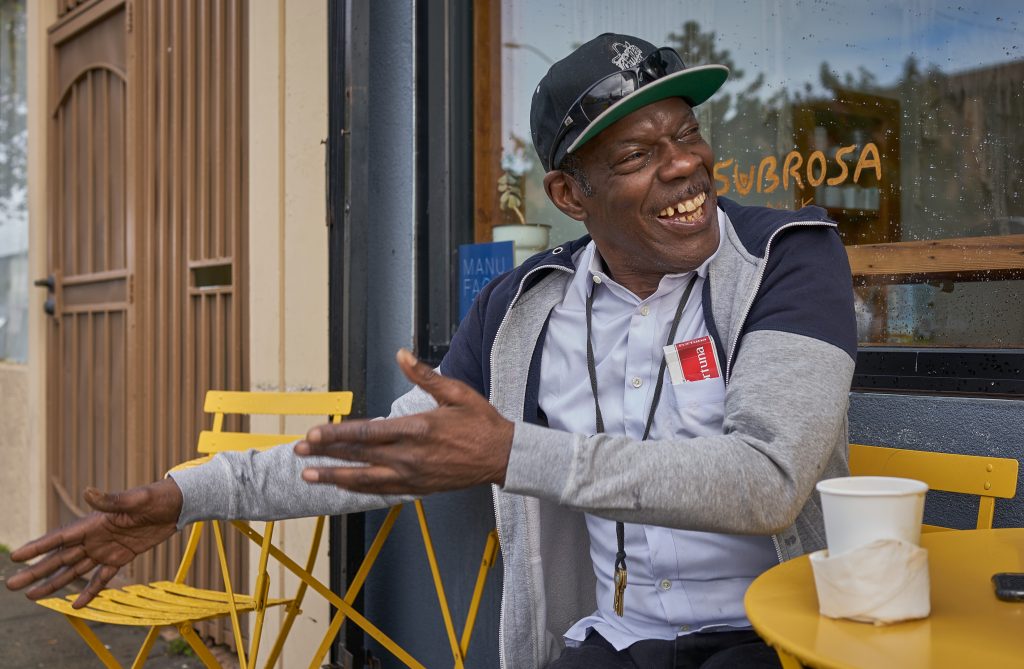
Ken Jones stands on the corner of Addison and Shattuck, waiting for people to exit a concert at the Freight and Salvage, or a play at the Berkeley Rep. In the cool evening light, he catches the eye of patrons spilling out of the theaters, flashing a smile at each person who looks up as he broadcasts his patter over the crowd.
“I hope you enjoyed the show, folks” he might say, wrapping them in his welcome.

At 70 years old, Ken is one of Street Spirit’s most long-time vendors. He initially got involved after seeing other people sell the paper. “I didn’t know how lucrative or exciting it could be until I started doing it,” he says.
But it’s not just the money that keeps him showing up. He has built a strong community in the Downtown Berkeley area. “It’s a small family gathering at the Freight and Salvage,” Ken says. “They miss me when I’m not there I miss them when they’re not there.”
Over the years, the community has grown to take care of each other. One day after he got cataract surgery, some of his regular customers asked to see the receipt. “The next thing I know they send me a card [with a check in it], saying, ‘Here’s a gift for you.’ And I’m saying, ‘wait a minute they actually paid for this?’ They paid for it. I almost cried.”
Likewise, Ken energizes the Downtown Berkeley community with his strong spiritand bright smile.
“I think that’s my job,” he says. “To uplift my fellow human beings. I am a lot happier when I can lift you up.”
Ken’s commitment to his customers is deeply embedded in his personality. When he devotes himselfto something, there is no looking back. There may be no better example of this than his relationship with his cat, Gracie.
Ken adopted Gracie from an animal shelter about 11 years ago. “I told my cat, ‘you will never be homeless again’,” Ken remembers. “‘I’m going to rescue you from homelessness just like somebody rescued me.’”
However, five years later, he had to move out of his apartment. He was forced to move before the end of the month, which put him on the street for a brief period. This meant he had to give Gracie back to the animal shelter. “It hurt me so bad that I started crying.” Ken says. “I could not believe I had broken my promise to my cat.”
However, Ken fell upon a stroke of good luck. A woman at the animal shelter adopted Gracie and gave her back to Ken once he was situated in his new place. “To me, it was still spiritual,” Ken says. “And I still tell my cat, we’re going to be together to the end.”

Ken’s calm demeanor and smooth sense of humor made it easy for him to win over the Downtown Berkeley crowd. But there’s a long history that led him to his post on Addison Street.
Ken Jones has lived in Berkeley for most of his life. He was born in Vallejo, where he lived with his grandmother through his teenage years. Then after high school, he moved to Berkeley. Why? “They had better-looking ladies over here,” he says, laughing.
For a teenage Ken, the women in Berkeley were an exciting distraction. His childhood in Vallejo was, as he describes, happy but unusual. Even though he was the youngest of three, Ken was tasked with a lot of responsibility as a child. His grandmother worked several jobs, and starting in elementary school, Ken was in charge of making sure the bills got paid. She would send him the money and tell him which bills to pay, and he made sure they were.
“The fact that my grandmother gave me responsibility…she instilled in my head that to be who you wanted to be, you had to work for it. I didn’t want to disappoint her, so that instilled in my head that everything that I do, I need to perform correctly and be the best at it,” Ken says.
This idea—that he needed to be the best—stuck with him throughout his adolescence. In Ken’s words, he became addicted to sports. He was the best on his team in baseball, where he played shortstop. That’s how he spent high school: he studied, he went to practice, and he went to church on Sunday with his grandmother.
Ken graduated high school in 1969, and moved to Berkeley the very next day. Despite his goal of meeting women, he busied himself with work. He got a job managing a self-service gas station in Oakland. Life was good, Ken says, but somewhere along the way he got caught up in drugs and fell off track. “I was introduced to drugs and that was the end of things, that was the end,” Ken says.
He spent the next 30 years of his life in the throes of addiction. “It was just, it was like being in a dream. And from 18 to 50 I was in this dream. And I couldn’t figure how to get out,” he said.
As Ken neared the age of 50, life was getting darker and darker. He was living under a freeway overpass in Downtown Oakland. There were voices in his head, telling him to do strange things. He got into a few sticky situations with drug dealers. He was sick of it, and willing to do anything to make the voices stop. Then, a thought occurred to him. He wanted to get spiritually stable. Soon after, he was walking to his campsite and he passed by the Salvation Army.
“What you learn is to be content with what you have”
“Spiritually, it just hit me. Go in there and let them help you,” he recalls. “It was spirituality, or something, because I had no idea what they did in there… [but] I had this willingness to try. To try another way except my own.”
Ken spent the next nine months of his life enrolled in the Salvation Army’s Drug and Alcohol Rehabilitation program. He approached it with the same diligence he applied to sports as a high schooler. He lived in the program’s Oakland Adult Rehabilitation Center, where he had to wake up at 6:00 every morning, keep a clean-shaven face, and hold a steady job. “You did something that kept your mind off the drugs. At all times you were doing something,” Ken describes. “By the time you finished the day you were usually too tired to think about anything.”
It was rigorous, but for Ken, rewarding. He says he was one of only a few in his class to formally graduate. “They are not going to fool around with you in this program because they realize if you’re not ready to quit using, you’re not ready,” he says.
To transition out of the program, Ken got a job and was placed in a halfway house for a little while. But sobriety did not ultimately translate to housing. In fact, Ken was sober and homeless for 10 years before he found a place to live.
“How to get housing, it’s set up real crooked,” Ken says. He remembers his years of looking for housing as a procession of jumping through hoop after hoop. In order to make the priority lists, he had to claim to have a drug problem. Then, a psychological problem. He had to prove that he was a “nuisance” to the city, and even remembers getting the Berkeley Police to approach the city and stress that he needed to be moved off the street. All the while, he was racking up warrants for trespassing for sleeping on sidewalks and in doorways. “I had like 35 warrants,” he said. “I said, ‘I gotta sleep somewhere.’”
Finally, he drew the line. By his recollection, he could not get the psychological clearance he needed for priority housing because he was not suicidal, and was not willing to pretend that he wanted to kill himself. “They put you through a thousand different things,” he says.
Despite this, Ken doesn’t speak ill of his time on the street.
“When I was homeless I was happy. What you learn is how to be content with what you have, ” he says, true to his positive attitude.

Around 2010, Ken got into subsidized housing. He remains housed in Oakland today. But housing brought about a new set of financial responsibilities: food, toilet paper, cat food. An excellent salesman, Ken is able to pay for basic needs with newspaper sales—though there have been times when his customers worried that might not be the case.
He jokes about a time when he had purchased a bag of food for Gracie before going out to sell papers. He set the bag down on the sidewalk and started walking up and down the line of people waiting outside the Freight and Salvage. Next thing he knows, everyone in line is whispering that he is eating cat food.
“No matter how much I told them ‘no this is for my cat,’ they wouldn’t believe me,” he laughs. “People were giving me money saying, ‘son take this here, you don’t have to eat cat food.’ I must have made $180 dollars in five minutes.”
A far cry from eating cat food, Ken loves to cook. His favorite meal is spaghetti and meatballs. He also loves reading mystery novels, particularly ones by John Clancy, and watching the Nature channel.
To those who know him, it may seem clear that his dogged commitment is what has brought him success in his life. But if you ask Ken, he’ll say it’s good luck.
“I haven’t bought a pair of shoes in 10 years,” he’ll cite as an example. “Every single time I need a pair of shoes, God seems to put a pair of shoes in my path,” he says, pointing to the pair he’s wearing now.
It may be luck, or optimism, or strength of spirit. Whatever it is, the whole neighborhood can feel it.
Street Spirits is a feature in which someone who lives on the street tells us their story.
Alastair Boone is the Director of Street Spirit.
